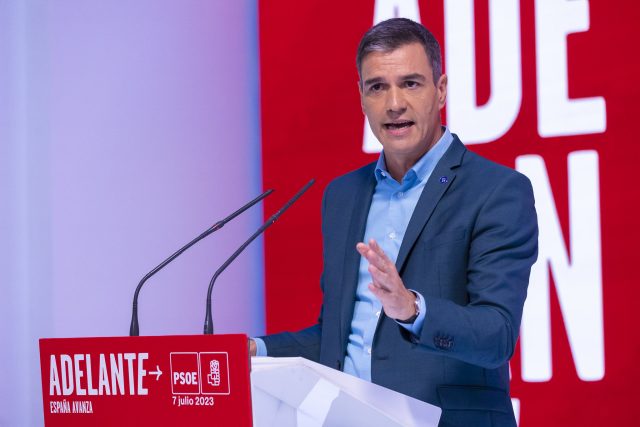
When Spanish Prime Minister Pedro Sánchez launched his campaign in Madrid, he appealed directly to disaffected voters in the center-right. “I ask the vote of those who favoured other political options”. Sánchez, the leader of the Spanish Socialist Party (PSOE), accused Alberto Núñez Feijóo, the president of the center-right Popular Party (PP), and Santiago Abascal, the leader of the conservative party Vox (ECR), of being “backward-looking”. He added “I even ask for the vote of those who voted for the Popular Party (PP) and are now ashamed of the pacts between Feijóo and Abascal”.
Sánchez said the results of the negotiations between Feijóo and Abascal had made Spain “go back 10 years on worker’s rights, 20 years in LGBTI rights, 40 years in women’s rights, and 80 years in culture censorship”. The prime minister conveyed his certainty “that the future will win, and the past will lose. The Socialist Party will win the elections…On July 23rd, Spain will move forward”.
Earlier that day, the PSOE campaign displayed a large ad in the “Gran Vía” one of Madrid’s busiest streets that mirrored the arguments of Sánchez’s speech. It shows a selfie of Sánchez and key members of his cabinet—including vice president, Minister for the Economy, and author of the picture, Nadia Calviño—with the label, and official campaign slogan, “Forward”. Below, there is an ominous black and white image of Feijóo and Abascal in Congress with the caption “Backwards”. This has not yet elicited a response from either Feijóo or Abascal.
Sánchez is appealing to the supposedly disaffected PP voter in the center and the center-right that is “embarrassed” for the coalitions and arrangements the parties of the right have reached in several cities and Autonomous Communities. After the May 28 regional and local elections, Feijóo and Abascal negotiated three agreements to govern the Valencia Community, the region of Extremadura and the Balearic Islands. Since 2019, both parties have been governing in coalition the region of Castilla-León, north of Madrid.
Sánchez’s strategy acknowledges Vox is the only alternative to the progressive consensus he has put “forward” in the last five years. Where he errs is putting the PP and Vox in the same basket. While both parties operate in the right side of the ideological spectrum and they have been working together on several fronts, they could not be more different. In Madrid, the PP passed a law that has allowed underage people to go into hormone replacement therapy and gender affirming surgery to please the international LGBTQ lobby. Vox has been against this law since it joined the regional Assembly and has called out the PP for it.
Under no circumstances will Vox govern in tandem or allow the socialists to govern. Feijóo has not shown any indications that he shares this outlook, leaving many in the right to wondering about his intentions and motivations.
PP and PSOE also share the need to maintain the two-party system that has allowed one kind of political class to thrive. The Spaniards will see Sánchez going head-to-head with Feijóo in the first televised debate of the election next Monday. The exclusion of Vox, and the seeming complacency from Feijóo on this decision, is yet another sign that the ECR representative in Spain is—again—offering a true alternative to the system Sánchez and Feijóo want to go back to.
After picking up in a number of polls, Pedro Sánchez is trying to maintain his party’s momentum during the first weekend of the campaign. He is behind the PP by an average of just 5 percentage points. Trailing behind are Sumar (a group of leftist parties) and Vox. The number of seats in parliament the forecasts predict for Vox will be enough to put conditions to a possible Feijóo premiership. Vox’s strength will, then, determine whether Spain remains socialist or not.



 Subscribe
Subscribe